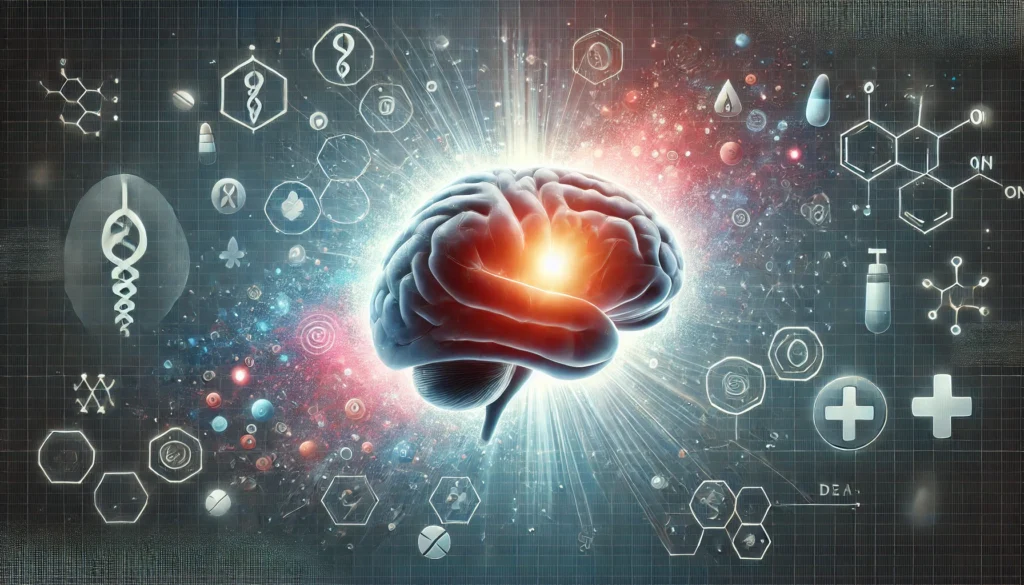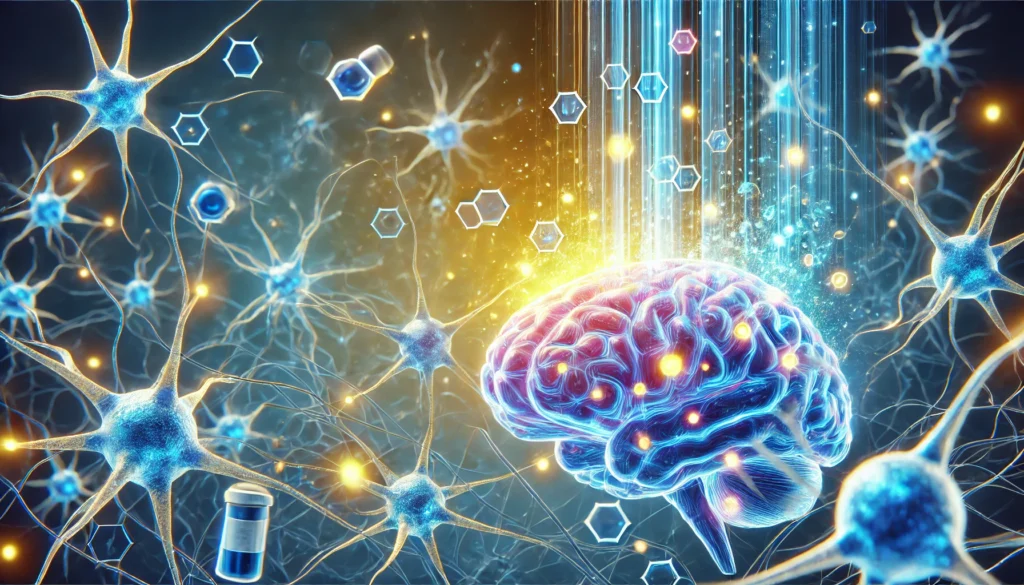Medications can impact memory in various ways, often through their effects on neurotransmitters, brain chemistry, and neural networks. The brain’s intricate system of neurons and synapses relies heavily on chemical messengers, such as neurotransmitters, to facilitate communication. When medications alter these chemical balances, it can lead to disruptions in memory processing.
You may also like: Top Brain Health Products to Consider
Neurotransmitter Disruption
Neurotransmitters like serotonin, dopamine, and acetylcholine play significant roles in cognitive functions, including memory. Medications that alter these neurotransmitters can disrupt synaptic communication, leading to memory impairment. For example, drugs that reduce acetylcholine can interfere with memory formation and retrieval, highlighting the delicate balance required for optimal brain function.
Structural Changes in Neural Networks
Long-term use of certain medications might lead to structural changes in the brain’s neural networks. These changes can affect how information is processed and stored. For instance, prolonged use of medications affecting neural plasticity can hinder the brain’s ability to form new connections, crucial for learning and memory.
Impact on Brain Regions
Different medications can impact specific brain regions associated with memory. For example, the hippocampus, critical for forming new memories, can be adversely affected by drugs that alter blood flow or neural activity. Understanding the regional impact of medications helps in pinpointing specific memory functions that might be compromised.
Common Medications Linked to Memory Impairment
Several classes of medications are known to affect memory. Understanding these can help individuals and healthcare professionals make informed decisions about treatment options.
Antidepressants
While antidepressants are essential for managing mental health conditions, some types, particularly those affecting serotonin and norepinephrine, have been associated with memory problems.
SSRIs and SNRIs
Selective serotonin reuptake inhibitors (SSRIs) and serotonin-norepinephrine reuptake inhibitors (SNRIs) are commonly prescribed antidepressants. They can impact cognitive processes by altering neurotransmitter levels, sometimes leading to memory lapses. Patients often report forgetfulness, which may improve after adjusting the medication or dosage.
Tricyclic Antidepressants
Older classes like tricyclic antidepressants are more likely to cause memory issues due to their broader impact on neurotransmitter systems. These medications can block acetylcholine, a neurotransmitter important for memory, leading to cognitive side effects that need careful management.
Individual Variability
The question, “Is memory loss from antidepressants permanent?” is common. Generally, memory issues may resolve after discontinuing the medication, but this varies from person to person. Factors such as dosage, duration of use, and individual brain chemistry all play roles in how memory is affected and recovered.
Benzodiazepines
Benzodiazepines, used for anxiety and insomnia, are notorious for their sedative effects, which can lead to short-term memory loss.
Mechanism of Action
These medications enhance the effect of the neurotransmitter gamma-aminobutyric acid (GABA), which has a calming effect on the brain. While effective for anxiety, the increased GABA activity can interfere with the brain’s ability to form and retain new memories, especially at higher doses.
Dose-Dependent Effects
The impact is often dose-dependent, with higher doses posing a greater risk. Patients on long-term benzodiazepine therapy may experience more pronounced memory issues, necessitating a careful evaluation of the risks and benefits of continued use.
Mitigating Memory Loss
Strategies to mitigate memory loss include using the lowest effective dose and considering alternative therapies for anxiety and insomnia. Gradual tapering, under medical supervision, can help reduce dependence and potentially improve cognitive function.
Antihistamines
Certain antihistamines, especially first-generation ones like diphenhydramine, can impair memory by crossing the blood-brain barrier and blocking acetylcholine, a neurotransmitter crucial for memory and learning.
First vs. Second-Generation Antihistamines
First-generation antihistamines are more likely to cause memory issues due to their ability to cross the blood-brain barrier. In contrast, second-generation antihistamines have a reduced impact on memory, offering a safer alternative for individuals needing allergy relief without cognitive side effects.

Acetylcholine Blockade
The blockade of acetylcholine by these medications can lead to difficulties in memory retention and recall. Understanding this mechanism is vital for choosing appropriate treatments, especially for older adults who may be more susceptible to cognitive side effects.
Considerations for Use
When using antihistamines, it’s important to weigh the benefits of allergy relief against potential cognitive side effects. Patients with a history of memory issues should discuss alternatives with their healthcare provider to minimize risks.
Statins
Statins, prescribed for cholesterol management, have been reported to cause memory problems in some individuals.
Cholesterol and Brain Function
While the exact mechanism is unclear, it’s hypothesized that statins might reduce cholesterol levels in the brain, affecting synaptic function. Cholesterol is essential for maintaining cell membrane integrity and neurotransmitter function, so its reduction could impact cognitive processes.
Individual Responses
Not everyone experiences memory problems with statins, suggesting individual differences in how these drugs affect brain chemistry. Genetic factors, concurrent medications, and overall health can influence the extent of cognitive side effects experienced.
Monitoring and Alternatives
For those experiencing cognitive side effects, monitoring cholesterol levels and exploring alternative lipid-lowering therapies may be necessary. Lifestyle changes, such as dietary modifications and exercise, can also support cholesterol management without compromising memory.
Beta-blockers
Beta-blockers, typically prescribed for heart conditions, can interfere with memory and cognition, possibly due to their effects on norepinephrine.
Norepinephrine’s Role
Norepinephrine is involved in attention and memory processes, and its modulation by beta-blockers can lead to cognitive changes. Patients on these medications might experience difficulties with concentration and memory recall.
Balancing Heart Health and Cognition
For individuals requiring beta-blockers, balancing heart health benefits with cognitive side effects is crucial. Adjusting the type or dosage of beta-blocker, or exploring alternative treatments, can help mitigate memory issues while maintaining cardiovascular health.
Personalized Treatment Plans
Developing personalized treatment plans that account for both cardiovascular needs and cognitive health can optimize patient outcomes. Collaboration between cardiologists and neurologists may be beneficial in managing these complex cases.
Medications and Long-term Memory Effects
Long-term memory effects from medications can be concerning, particularly for those on chronic medication regimens. It’s essential to weigh the benefits and risks with a healthcare provider, especially if memory issues arise.
Chronic Medication Use
Chronic use of certain medications necessitates regular evaluation of cognitive health. Long-term exposure can lead to cumulative effects on memory, requiring ongoing assessment and potential adjustments to treatment plans.
Risk-Benefit Analysis
A thorough risk-benefit analysis helps determine whether the therapeutic benefits of a medication outweigh its cognitive side effects. This process involves considering alternative therapies that may offer similar benefits with fewer cognitive risks.
Patient-Centered Care
Patient-centered care emphasizes the importance of involving patients in decision-making regarding their treatment. Understanding patient priorities, such as cognitive function and quality of life, guides healthcare providers in tailoring treatment strategies.
Exploring Solutions and Alternatives
When faced with medication-induced memory problems, consider these strategies:
Medication Review and Adjustment
Discussing concerns with a healthcare provider can lead to adjustments in medication type or dosage, potentially alleviating memory issues.
Comprehensive Medication Review
A comprehensive medication review involves examining all current medications to identify those that may contribute to memory problems. This process can reveal potential drug interactions and highlight opportunities for adjustments.
Dose Optimization
Optimizing medication dosages to the minimum effective level can reduce cognitive side effects. Careful titration, with regular monitoring, ensures therapeutic goals are met while minimizing memory impairment.
Switching Medications
In some cases, switching to alternative medications with fewer cognitive side effects may be beneficial. This decision should be made collaboratively, considering the patient’s medical history and treatment goals.
Cognitive Enhancements
In some cases, cognitive enhancers or nootropics might be recommended to support memory function. However, these should be used under medical supervision to avoid adverse effects.
Role of Nootropics
Nootropics are substances believed to improve cognitive function, particularly memory and learning. While some evidence supports their use, they should be approached cautiously, as interactions with other medications can occur.
Natural Cognitive Boosters
Natural supplements, such as omega-3 fatty acids and ginkgo biloba, have been studied for their potential cognitive benefits. Incorporating these into a treatment plan, with medical guidance, may support memory function without significant side effects.
Mindfulness and Cognitive Training
Mindfulness practices and cognitive training exercises can enhance memory and concentration. These non-pharmacological approaches offer additional support for individuals experiencing medication-induced memory issues.
Lifestyle Modifications
Engaging in activities that promote brain health, such as regular exercise, a balanced diet rich in omega-3 fatty acids, and mental exercises, can help mitigate memory issues.
Exercise and Brain Health
Regular physical activity is associated with improved cognitive function and memory. Exercise enhances blood flow to the brain, supports neurogenesis, and reduces stress, all of which contribute to better memory performance.
Dietary Interventions
A diet rich in brain-healthy nutrients, such as omega-3 fatty acids, antioxidants, and vitamins, supports cognitive function. Incorporating foods like fatty fish, berries, and leafy greens can help protect against memory decline.
Mental Stimulation
Engaging in mentally stimulating activities, such as puzzles, reading, and learning new skills, keeps the brain active and supports memory function. These activities encourage neural plasticity and cognitive resilience, counteracting some medication-induced effects.

The Role of Healthcare Professionals
Healthcare professionals play a pivotal role in identifying and managing medication-induced memory problems. They can provide tailored advice, considering the individual’s health history and current medications.
Comprehensive Assessment
A thorough assessment can help determine whether memory issues are medication-related or due to other factors, such as underlying health conditions or lifestyle choices.
Diagnostic Evaluation
A diagnostic evaluation includes cognitive testing and a review of the patient’s medical history. This process helps identify the root cause of memory issues, guiding appropriate interventions.
Collaboration with Specialists
Collaboration with specialists, such as neurologists and psychiatrists, can enhance the diagnostic process. These experts provide insights into complex cases, ensuring accurate identification of medication-related memory problems.
Addressing Comorbidities
Addressing comorbid conditions, such as depression or hypertension, may improve cognitive outcomes. Managing these conditions in conjunction with medication adjustments can lead to better overall health and memory function.
Monitoring and Follow-up
Regular monitoring and follow-up appointments allow for timely interventions and adjustments, minimizing the impact on memory and cognitive function.
Ongoing Patient Monitoring
Ongoing monitoring involves regular cognitive assessments and patient feedback. This approach helps track changes in memory and cognition, facilitating early intervention when necessary.
Adjusting Treatment Plans
Based on monitoring results, healthcare providers can adjust treatment plans to optimize cognitive outcomes. This may involve modifying medication regimens or implementing additional supportive therapies.
Patient Education and Support
Educating patients about the potential cognitive effects of their medications empowers them to participate actively in their care. Providing support and resources helps patients manage their memory issues effectively.
Future Directions in Medication and Memory Research
Research continues to uncover the complex interactions between medications and memory. Future studies may provide clearer insights into minimizing adverse effects while maximizing therapeutic benefits.
Innovative Treatments
Emerging treatments and technologies, such as precision medicine and pharmacogenomics, hold promise for more personalized and effective approaches to managing medication-induced memory issues.
Precision Medicine
Precision medicine tailors treatments based on individual genetic profiles, potentially reducing cognitive side effects. This approach considers how genetic variations affect drug metabolism and response, leading to more effective and safer therapies.
Pharmacogenomics
Pharmacogenomics studies how genes influence individual responses to medications. By understanding genetic factors, healthcare providers can predict which patients are more likely to experience cognitive side effects, enabling personalized treatment plans.
Future Therapeutics
Advancements in drug development aim to create medications with fewer cognitive side effects. Research focuses on designing drugs that target specific pathways, minimizing unintended impacts on memory and cognition.
Public Awareness and Education
Increasing public awareness about the potential cognitive effects of medications is crucial. Educating patients empowers them to engage in informed discussions with their healthcare providers, leading to better health outcomes.
Patient Empowerment
Empowering patients with knowledge about medication effects fosters informed decision-making. Patients who understand the potential cognitive risks are better equipped to discuss treatment options and preferences with their healthcare providers.
Healthcare Provider Training
Training healthcare providers to recognize and address medication-induced memory issues enhances patient care. Providers who are aware of these effects can guide patients in managing cognitive side effects effectively.
Community Outreach
Community outreach initiatives can raise awareness of medication-induced memory issues. Workshops, seminars, and informational campaigns provide valuable resources to patients and their families, promoting proactive health management.

Conclusion
Understanding the impact of medications on memory function is essential for those seeking to optimize their mental and physical health. By staying informed and working closely with healthcare providers, individuals can navigate the complexities of medication management and memory health effectively. Whether you are a health and wellness coach, a science journalist, or a biohacker, having a comprehensive understanding of these interactions will enhance your ability to provide valuable insights and guidance.
Through informed choices and proactive management, it is possible to mitigate the memory-impairing effects of medications while maintaining overall well-being. By prioritizing cognitive health and collaborating with healthcare professionals, individuals can achieve a balanced approach to medication use and mental clarity, leading to improved quality of life and sustained cognitive vitality.
Further Reading:
10 Drugs That May Cause Memory Loss
A List of Drugs Linked to Dementia
Medications That Can Mimic Dementia
Important Note: The information contained in this article is for general informational purposes only, and should not be construed as health or medical advice, nor is it intended to diagnose, prevent, treat, or cure any disease or health condition. Before embarking on any diet, fitness regimen, or program of nutritional supplementation, it is advisable to consult your healthcare professional in order to determine its safety and probable efficacy in terms of your individual state of health.
Regarding Nutritional Supplements Or Other Non-Prescription Health Products: If any nutritional supplements or other non-prescription health products are mentioned in the foregoing article, any claims or statements made about them have not been evaluated by the U.S. Food and Drug Administration, and such nutritional supplements or other health products are not intended to diagnose, treat, cure, or prevent any disease.


